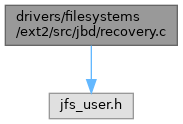#include "jfs_user.h"
Go to the source code of this file.
Classes | |
| struct | recovery_info |
Macros | |
| #define | wrap(journal, var) |
Enumerations | |
| enum | passtype { PASS_SCAN , PASS_REVOKE , PASS_REPLAY } |
Functions | |
| static int | do_one_pass (journal_t *journal, struct recovery_info *info, enum passtype pass) |
| static int | scan_revoke_records (journal_t *, struct buffer_head *, tid_t, struct recovery_info *) |
| static int | jread (struct buffer_head **bhp, journal_t *journal, unsigned int offset) |
| static int | count_tags (struct buffer_head *bh, int size) |
| int | journal_recover (journal_t *journal) |
| int | journal_skip_recovery (journal_t *journal) |
Macro Definition Documentation
◆ wrap
Definition at line 207 of file recovery.c.
Enumeration Type Documentation
◆ passtype
Function Documentation
◆ count_tags()
|
static |
Definition at line 182 of file recovery.c.
Referenced by do_one_pass().
◆ do_one_pass()
|
static |
Definition at line 311 of file recovery.c.
Referenced by journal_recover(), and journal_skip_recovery().
◆ journal_recover()
| int journal_recover | ( | journal_t * | journal | ) |
journal_recover - recovers a on-disk journal @journal: the journal to recover
The primary function for recovering the log contents when mounting a journaled device.
Recovery is done in three passes. In the first pass, we look for the end of the log. In the second, we assemble the list of revoke blocks. In the third and final pass, we replay any un-revoked blocks in the log.
Definition at line 225 of file recovery.c.
Referenced by journal_load().
◆ journal_skip_recovery()
| int journal_skip_recovery | ( | journal_t * | journal | ) |
journal_skip_recovery - Start journal and wipe exiting records @journal: journal to startup
Locate any valid recovery information from the journal and set up the journal structures in memory to ignore it (presumably because the caller has evidence that it is out of date). This function does'nt appear to be exorted..
We perform one pass over the journal to allow us to tell the user how much recovery information is being erased, and to let us initialise the journal transaction sequence numbers to the next unused ID.
Definition at line 282 of file recovery.c.
Referenced by journal_wipe().
◆ jread()
|
static |
Definition at line 132 of file recovery.c.
Referenced by do_one_pass().
◆ scan_revoke_records()
|
static |
Definition at line 571 of file recovery.c.
Referenced by do_one_pass().